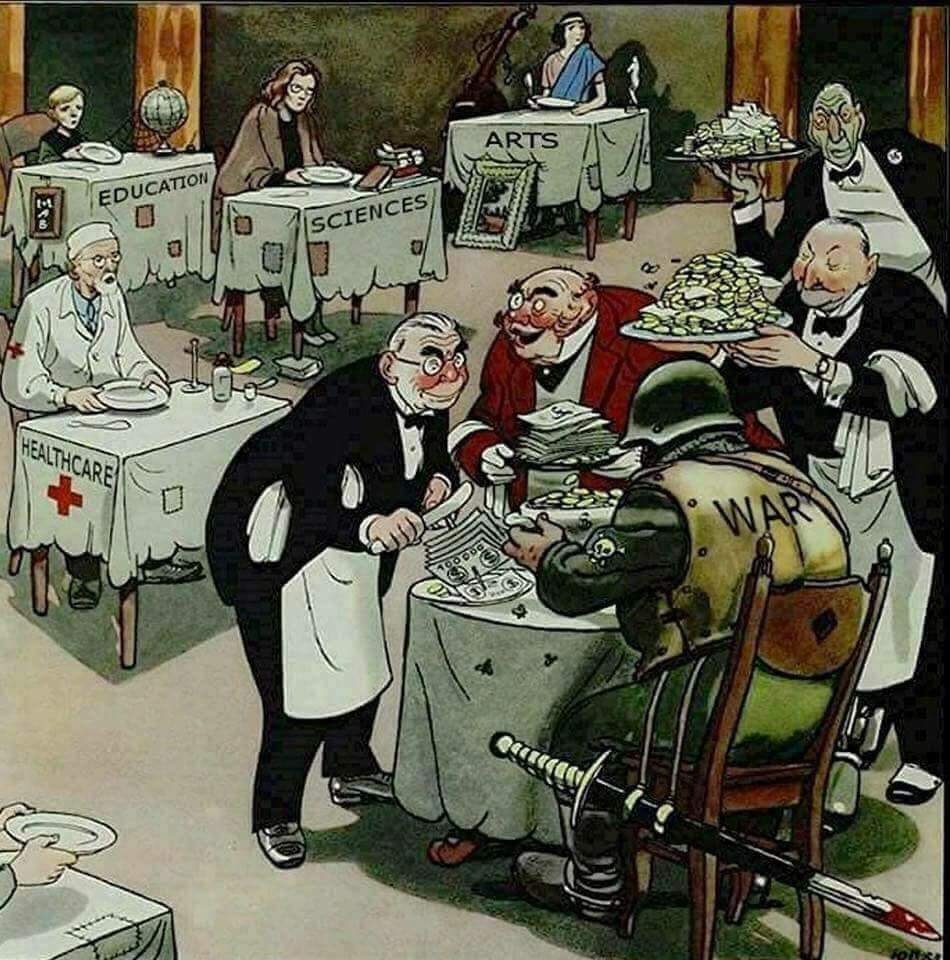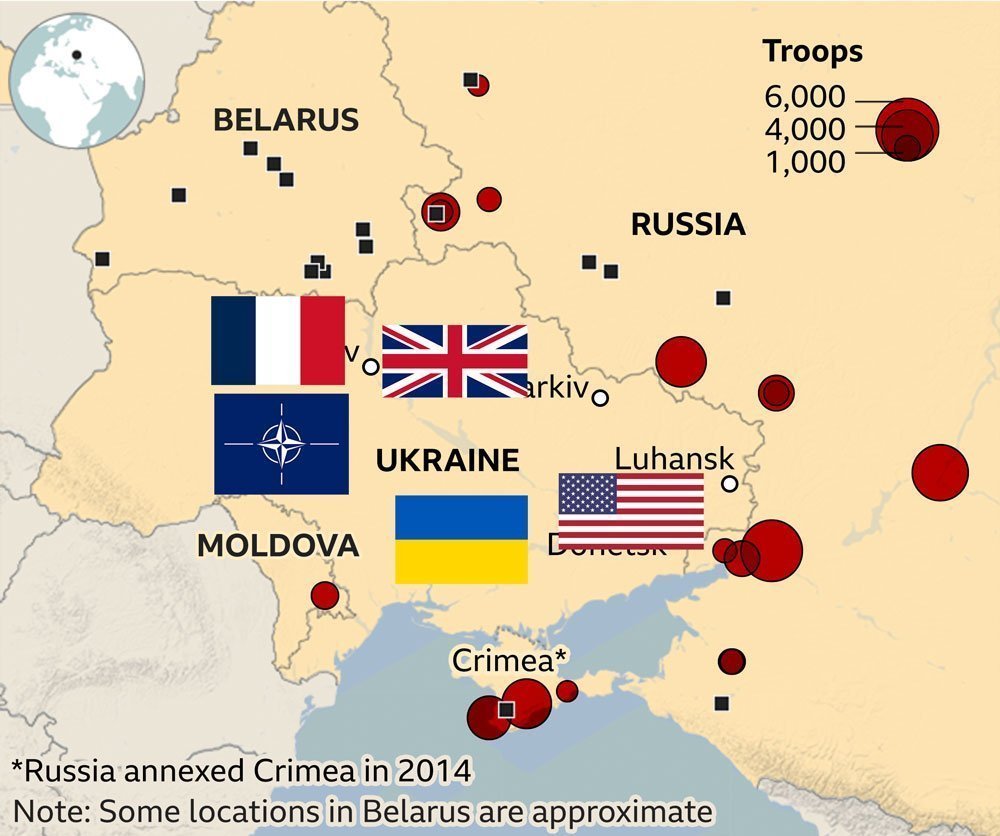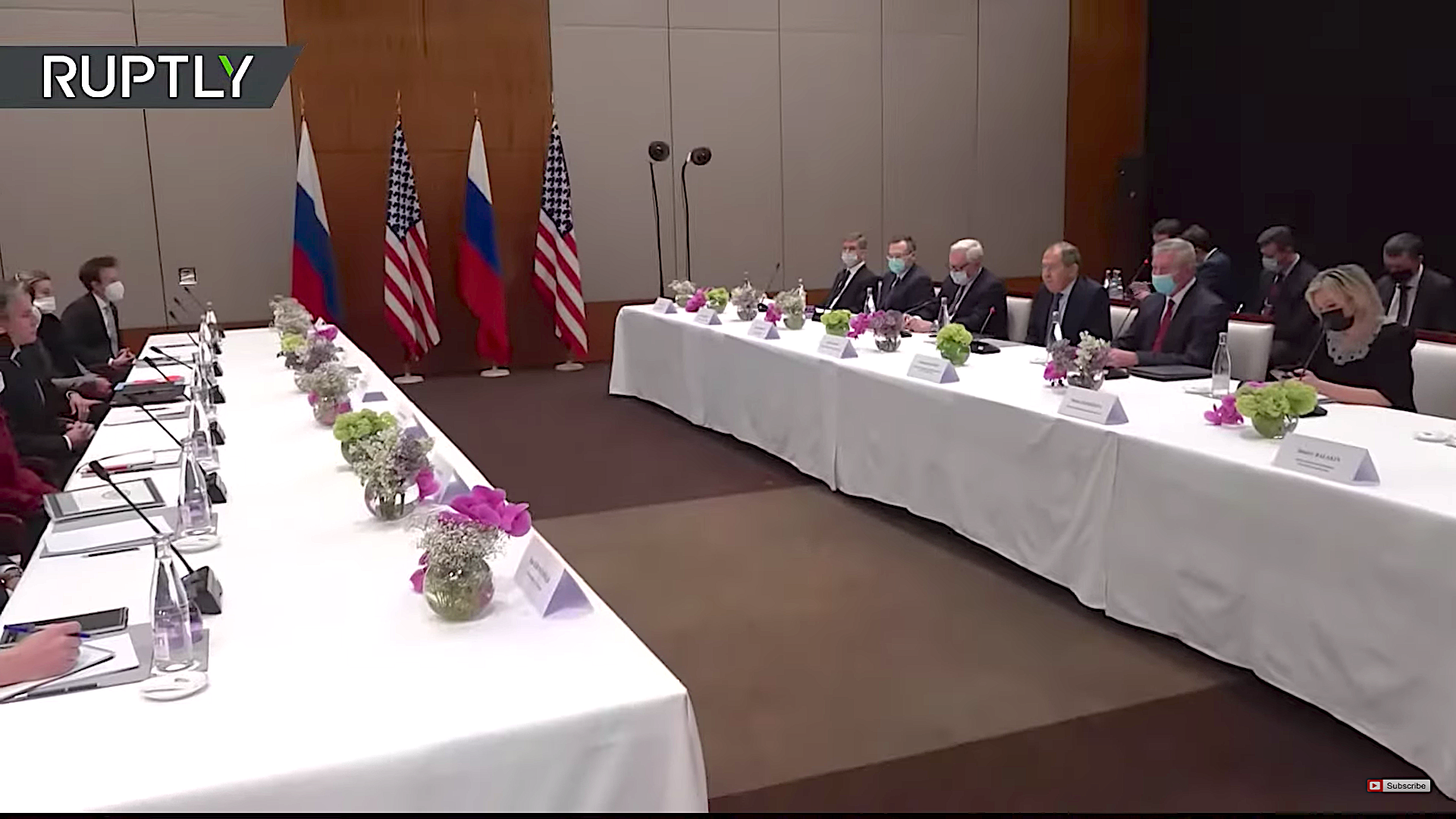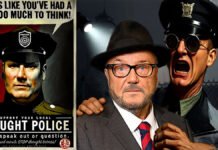Russia’s President Vladimir Putin has accused the US of trying to draw his country into a war in Ukraine.
In his first significant comments on the crisis in several weeks, he said America’s goal was to use a confrontation as a pretext to impose more sanctions on Russia.
He also said the US was ignoring Russia’s demands that NATO not expand eastward in his first remarks on rising tensions over Ukraine in more than a month.
But he added that Moscow is still open to more talks with the West on easing tensions over Ukraine.
Putin said the Kremlin was still studying the US and NATO’s response to Russia’s security demands which included that NATO ‘not’ expand to Ukraine and other former Soviet countries and that it rolls back deployments in Eastern Europe.
He added that the US and its allies violated obligations on the integrity of security made at the Organisation for Security and Cooperation in Europe (OSCE).
The Russian leader also argued that while Western allies emphasise every country’s freedom to choose alliances, they neglect the principle of the “indivisibility of security” enshrined in the OSCE documents.
That involves the principle that the security of one nation should not be strengthened at the expense of others.
Putin was speaking after meeting with Hungarian Prime Minister Viktor Orban at the Kremlin where they spoke about tensions in Ukraine.
In Ukraine itself, visiting UK Prime Minister Boris Johnson accused Mr Putin of effectively “holding a gun… to the head of Ukraine” and he called on the Kremlin to step back from a “military disaster”.
Speaking after talks with Ukrainian President Volodymyr Zelensky in the capital Kyiv, he told reporters the Ukrainian army would fight back in the event of an invasion.
“There are 200,000 men and women under arms in Ukraine,” he said. “They will put up a very, very fierce and bloody resistance and I think that parents, mothers, in Russia, should reflect on that fact. And I hope very much that President Putin steps back from the path of conflict and that we engage in dialogue.”
Mr Johnson warned that the UK would respond to Russian aggression with a “package of sanctions and other measures to be enacted the moment the first Russian toecap crosses further into Ukrainian territory”.
The UK has announced it is giving £88m to Ukraine to promote stable governance and energy independence from Russia.
Ukraine’s president said it would “not be a war between Ukraine and Russia – this would be a war in Europe, a full-scale one”.
He called for sanctions to be introduced before any escalation, saying he would support any move by the UK to deal with “dirty money” allegedly linked to the Kremlin being laundered through the City of London.
Of course, the propaganda claims Russia is poised to invade Ukraine after a build-up of Russian troops on the Ukrainian border the reality is the West is poking the Bear.
The reality is a one thousand eight hundred miles away a British squaddie is now standing on the Russian border taking a piss, just maybe thinking the last time British troops were in combat in that particular region was in 1853 “The Crimean War” Ironically that war woke the Great Bear and Russia moved to become a superpower, of course, Russian rearmament would suit the West, a brand new arms race for the industrial arms complex, so what if a few working-class soldiers get killed, its all for a good cause, their profits.

Let’s take a look back at the history of NATO expansion from West Germany to the Russian border.
Joe Lauria is editor-in-chief of Consortium News and a former U.N. correspondent for The Wall Street Journal, Boston Globe, and numerous other newspapers. He was an investigative reporter for the Sunday Times of London gives us a detailed look at Western expansionism.
Earlier on Tuesday, US Secretary of State Antony Blinken told his Russian counterpart, Sergei Lavrov, by phone that it was time for Moscow to pull its troops back from the borders if it was sincere about not planning to invade, a senior state department official was quoted as saying by Reuters news agency.
Mr Blinken added that the US and its allies were willing to continue substantive discussions with Russia on mutual security concerns.
Tangled Tale of NATO Expansion at the Heart of Ukraine Crisis

The U.S. response to winning the Cold War set the stage for the current crisis with Russia, reports Joe Lauria.
The end of the Cold War with the fall of the Berlin Wall in 1989 and the end of the Soviet Union two years later presented the United States with a choice: triumphalism or reconciliation.
There was hope of a “peace dividend” because the fortune spent on armaments for so long could now be spent on domestic needs. The Warsaw Pact dissolved and there was hope that its counterpart, the North Atlantic Treaty Organization, would also pass into history. Rather its expansion has become a flashpoint in the current standoff over Ukraine.
To assent to the reunification of Germany, Soviet leader Mikhail Gorbachev ultimately agreed to a proposal from then U.S. Secretary of State James Baker that a reunited Germany would be part of NATO but the military alliance would not move “one inch” to the east, that is, absorb any of the former Warsaw Pact nations into NATO.
On Feb. 9, 1990, Baker said: “We consider that the consultations and discussions in the framework of the 2+4 mechanism should give a guarantee that the reunification of Germany will not lead to the enlargement of NATO’s military organization to the East.” On the next day, then German Chancellor Helmut Kohl said: ““We consider that NATO should not enlarge its sphere of activity.”
Gorbachev’s mistake was not to get it in writing as a legally-binding agreement. For years it was believed there was no written record of the Baker-Gorbachev exchange at all, until the National Security Archive at George Washington University in December 2017 published a series of memos and cables about these assurances against NATO expansion eastward. The archive reported:
“U.S. Secretary of State James Baker’s famous ‘not one inch eastward’ assurance about NATO expansion in his meeting with Soviet leader Mikhail Gorbachev on February 9, 1990, was part of a cascade of assurances about Soviet security given by Western leaders to Gorbachev and other Soviet officials throughout the process of German unification in 1990 and on into 1991, according to declassified U.S., Soviet, German, British and French documents …
The documents show that multiple national leaders were considering and rejecting Central and Eastern European membership in NATO as of early 1990 and through 1991, that discussions of NATO in the context of German unification negotiations in 1990 were not at all narrowly limited to the status of East German territory, and that subsequent Soviet and Russian complaints about being misled about NATO expansion were founded in written contemporaneous memcons and telcons at the highest levels. … The documents reinforce former CIA Director Robert Gates’s criticism of ‘pressing ahead with expansion of NATO eastward [in the 1990s], when Gorbachev and others were led to believe that wouldn’t happen.’ …
President George H.W. Bush had assured Gorbachev during the Malta summit in December 1989 that the U.S. would not take advantage (‘I have not jumped up and down on the Berlin Wall”) of the revolutions in Eastern Europe to harm Soviet interests.’”
One Jan. 31, 1990 cable from the U.S. embassy in Bonn informed Washington that German Foreign Minister Hans-Dietrich Genscher’s speech that day made clear “that the changes in Eastern Europe and the German unification process must not lead to an ‘impairment of Soviet security interests.’ Therefore, NATO should rule out an ‘expansion of its territory towards the east, i.e. moving it closer to the Soviet borders.’”

On Tuesday, The New Yorker magazine published a detailed analysis of what transpired at that time. The piece reveals that H.W. Bush “strongly opposed Baker’s proposal [with Gorbachev], which was quickly abandoned.” What Gorbachev thought was a “deal” back in Washington was reduced to a “proposal” cast aside, despite Bush’s vow that the U.S. would not engage in triumphalism. Even then Russian President Boris Yeltsin, the piece says, eventually rejected NATO expansion, but not after first agreeing to it after Lech Walesa plied him with drinks:
“One night in Warsaw, over dinner and drinks, the Polish President at the time, Lech Walesa, managed to persuade Yeltsin to issue a joint statement that the prospect of Poland joining NATO was ‘not contrary to the interest of any state, also including Russia.’ But, faced with a domestic political backlash, Yeltsin quickly retracted that statement. In fact, Yeltsin and his diplomats eventually argued, the 1990 agreement on German reunification prohibited any further eastward NATO expansion … “
President Bill Clinton’s administration investigated the matter and concluded that Yeltsin was wrong and that no NATO expansion eastward was ever promised. The New Yorker reported:
“At a summit in Helsinki, Clinton promised to give Yeltsin four billion dollars in investment in 1997, as much as the U.S. had provided in the five years prior, while also dangling W.T.O. membership and other economic inducements. In return, Russia would effectively allow unencumbered NATO enlargement. Yeltsin worried that these measures could be perceived as ‘sort of a bribe,’ but, given Russia’s empty coffers and his uphill prospects for reëlection, he relented.”
NATO was set up in 1949 as a 12-nation military alliance against the hyped fear of an invasion of Western Europe by a devastated Soviet Union. In the 1950s, Greece, Turkey and Germany joined, and Spain in 1982, bringing the total of members to 16. But since 1997 when Yeltsin agreed to with “sort of a bribe,” NATO has added 14 new members, including nine that had been behind the “Iron Curtain.”
The “peace dividend” had turned into an expansion payoff, as arms contractors lobbied hard for these new NATO members to be accepted, as The New York Times reported in 1998.
Brzezinski Weighed In

Brzezinski at the chessboard, 1978.
As the NATO expansion debate was playing out, Jimmy Carter’s former national security advisor Zbigniew Brzezinski, who still wielded influence in Washington, wrote a piece in 1995 for Foreign Affairs, entitled “A Plan for Europe,” in which he said:
“As a practical matter, the issue of formally widening the alliance .. can no longer be avoided. … The absence of a longer-range design for Europe can deprive the alliance of its historical raison d’être. … It is not carping criticism to point out that, so far, the Clinton administration has projected neither a strategic vision nor a clear sense of direction on a matter of such salience to Europe’s future as enlarging NATO. … Continued U.S. waffling could also consolidate Russian opposition to any expansion of NATO so that any eventual move to widen the alliance will unavoidably be seen as conveying a hostile message to Moscow.”
Ever focused on control of Eurasia, Brzezinski appeared to favour post-Soviet Russia drawing closer to Europe as opposed to Eurasia. “Fundamentally, the political struggle within Russia is over whether Russia will be a national and increasingly European state or a distinctively Eurasian and once again an imperial state,” he wrote.
Brzezinski worried what Moscow’s reaction would be if it were eventually denied an offer to join NATO. “If excluded and rejected, they will be resentful, and their own political self-definition will become more anti-European and anti-Western,” he wrote. It was an offer never made.
According to a 2014 article in Foreign Affairs: “’ You say that NATO is not directed against us, that it is simply a security structure that is adapting to new realities,’ Gorbachev told Baker in May, according to Soviet records. ‘Therefore, we propose to join NATO.’ Baker refused to consider such a notion, replying dismissively, ‘Pan-European security is a dream.’”
Brzezinski urged that an announcement of expansion be made quickly, with the details to be worked out later. “The longer this is delayed, the more vociferous Moscow’s objections are likely to be,” Brzezinski wrote.
He added, however, that “talk of a … Russian military threat is not justified, either by actual circumstances or even by worst-case scenarios for the future. The expansion of NATO should, therefore, not be driven by whipping up anti-Russian hysteria that could eventually become a self-fulfilling prophecy.”
Brzezinski called for “‘no forward deployment’ of NATO forces in Central Europe [that] would underline the nonantagonistic character of the expansion. This should mitigate some of Russia’s legitimate concerns.”
Anti-Russian feelings in the U.S. began to rise with the ascension of Vladimir Putin to power on the last day of 1999 after Wall Street and Washington had had dominant influence over Yeltsin’s post-Soviet Russia. It built into full-blown, anti-Russia hysteria by 2014 and has been cresting ever since, reaching new peaks with Russiagate (despite it having been proven false.) NATO forward deployments in Central Europe have been routine for years and are growing by the day in the midst of the current crisis.
Brzezinski, however, put a huge caveat in his understanding of Moscow’s position, saying that “not all of Russia’s concerns are legitimate — and the alliance should not shrink from making that known.” Brzezinski agreed with H.W. Bush scotching Baker’s agreement with Gorbachev:
“Just five years ago [1990], the alliance had to overcome Russian objections to the inclusion of the reunited Germany in NATO. Wisely, the Bush administration spurned those who favoured acquiescence to the Kremlin. Face with U.S. determination to include the united Germany in NATO, with or without Russia’s assent, Moscow wisely assented.”
He said the issue of NATO expansion calls for “a similar display of constructive firmness. The Kremlin must be made to understand that bluster and threats will be neither productive nor effective and may even accelerate the process of expansion.”
In view of the current Russian demand for a treaty that would preclude Ukraine and Georgia joining NATO, Brzezinski said Russia does not have “the right” to “veto NATO expansion.”
Nevertheless, Brzezinski was more forward thinking than the Biden administration today. He said the “independent decision of the alliance to enlarge its membership should be accompanied by a simultaneous invitation to Russia to help create a new transcontinental system of collective security, one that goes beyond the expansion of NATO proper.” Putin is demanding a new “security architecture” for Europe.
Drawing the Line
It is difficult to fathom that the U.S. leaders in power in the 1990s would not understand future problems with Russia over this expansion, as even their man Yeltsin voiced concerns. They were confronted with those problems in Putin’s 2007 Munich speech: “We have the right to ask: against whom is this [NATO] expansion intended? And what happened to the assurances our western partners made after the dissolution of the Warsaw Pact? Where are those declarations today? No one even remembers them.”
Putin spoke three years after the Baltic States, former Soviet republics bordering on Russia, joined the Western Alliance. A year after his speech, NATO said Ukraine and Georgia would become members, which has not yet happened, but four more eastern European states joined in 2009.
Since then NATO has held many military exercises Russia has found threatening. TASS reported in December that NATO holds 40 exercises a year near Russian territory. It said:
“US strategic aviation has considerably increased flights along Russian borders. During such flights the planes simulated launches of cruise missiles against targets inside Russian territory. ‘Over the past month alone there have been 30 flights, twice more than in the same period last year,’ [chief of Russia’s General Staff Valery] Gerasimov said.”
In 2016, a 10-day manoeuvre was carried out in Poland with 31,000 NATO troops from 24 nations and thousands of tanks and other vehicles. The exercise was the first time German troops taking part crossed Poland towards Russia since the Nazi invasion of 1941.
These moves led then German Foreign Minister Frank-Walter Steinmeier to accuse NATO of “saber-rattling” and “war-mongering.” Steinmeier told Bild am Sontag newspaper:
“‘What we shouldn’t do now is inflame the situation further through saber-rattling and warmongering. Whoever believes that a symbolic tank parade on the alliance’s eastern border will bring security is mistaken. We are well-advised to not create pretexts to renew an old confrontation,” saying it would be ‘fatal to search only for military solutions and a policy of deterrence.’”
That year NATO also installed a missile base in Romania that can strike Russia, claiming it was only “defensive” against incoming missiles from Iran, though the weapons can also be used offensively. A similar missile base, previously cancelled, is slated to be operational in Poland later this year.
Six years after NATO promised Ukraine would one day become a member, the U.S. led a coup in Kiev that overthrew a democratically-elected president who leaned towards Moscow. The U.S. move seemed to come from Brzezinski’s playbook. In his 1997 book, The Grand Chessboard: American Primacy and Its Geostrategic Imperatives, he wrote:
“Ukraine, a new and important space on the Eurasian chessboard, is a geopolitical pivot because its very existence as an independent country helps to transform Russia. Without Ukraine, Russia ceases to be a Eurasian empire. Russia without Ukraine can still strive for imperial status, but it would then become a predominantly Asian imperial state.”
Thus U.S. “primacy,” or world dominance, which still drives Washington, is not possible without control of Eurasia, as Brzezinski argued, and that’s not possible without control of Ukraine by pushing Russia out. What Brzezinski and U.S. leaders still view as Russia’s “imperial ambitions” are in Moscow seen as imperative defensive measures against an aggressive West.
Pushed Too Far

Nearly 15 years after Putin’s Munich speech, in which he began to draw the line with the West, Russia has had enough. It chose this moment to confront the U.S. and demand a resolution to these issues in draft treaties that would halt NATO expansion, prevent Ukraine and Georgia from joining, and prohibit NATO states from deploying “ground-launched intermediate-range and shorter-range missiles outside their national territories from which such weapons can attack targets in the national territory of the other Party.”
The treaty proposal makes a clear reference to Ukraine, saying, “The Parties shall not use the territories of other States with a view to preparing or carrying out an armed attack against the other Party or other actions affecting core security interests of the other Party.”
As Western arms pour into Ukraine ostensibly to defend against the “invasion,” but quite possibly to arm a Kiev offensive in the east, the draft with the U.S. says:
“The Parties shall refrain from deploying their armed forces and armaments, including in the framework of international organizations, military alliances or coalitions, in the areas where such deployment could be perceived by the other Party as a threat to its national security, with the exception of such deployment within the national territories of the Parties.”
Last week, after talks with U.S. Secretary of State Antony Blinken in Geneva, Russian Foreign Minister Sergei Lavrov said NATO “was set up against the Soviet Union and for some reason, it still works against Russia.”
In the draft treaty with the U.S., Russia argues, among other points, that NATO’s insistence that it can admit any member that it wants clashes with its members’ obligations under the 1975 Helsinki Accords that the national security interests of one or more states parties should not threaten the security of another.
The proposed treaty says: “The United States of America shall undertake to prevent further eastward expansion of the North Atlantic Treaty Organization and deny accession to the Alliance to the States of the former Union of Soviet Socialist Republics.”
Russia sees itself as finally standing up to a bully. Often a bully will back down when finally challenged. But other times the bully, who’s been falsely accusing his victim of being the aggressor, twists this challenge into a new opportunity to play the victim and go on the attack.
Russia’s troop deployments on its territory near Ukraine and its vow to resort to “technical-military” means is not seen publicly by the U.S. as a Russian negotiating tactic to pressure Washington to take its draft treaties seriously, but as an “imminent” threat of invasion.
The U.S. portrays its talks this month with Russia not as an effort to create a new European security arrangement, which even Brzezinski had called for, but only to prevent a Russian invasion.
The war mania being drummed up in U.S. and British media recalls Brzezinski‘s warning that “whipping up anti-Russian hysteria … could eventually become a self-fulfilling prophecy.”
It is not a new trick. Mark Twain warned:
“The statesmen will invent cheap lies, putting the blame upon the nation that is attacked, and every man will be glad of those conscience-soothing falsities, and will diligently study them, and refuse to examine any refutations of them; and thus he will by and by convincing himself the war is just, and will thank God for the better sleep he enjoys after this process of grotesque self-deception.”
Joe Lauria is editor-in-chief of Consortium News and a former U.N. correspondent for The Wall Street Journal, Boston Globe, and numerous other newspapers. He was an investigative reporter for the Sunday Times of London and began his professional work as a 19-year old stringer for The New York Times. He can be reached at joelauria@consortiumnews.com and followed on Twitter @unjoe
Support Independent Journalism Today
Our unwavering dedication is to provide you with unbiased news, diverse perspectives, and insightful opinions. We're on a mission to ensure that those in positions of power are held accountable for their actions, but we can't do it alone. Labour Heartlands is primarily funded by me, Paul Knaggs, and by the generous contributions of readers like you. Your donations keep us going and help us uphold the principles of independent journalism. Join us in our quest for truth, transparency, and accountability – donate today and be a part of our mission!
Like everyone else, we're facing challenges, and we need your help to stay online and continue providing crucial journalism. Every contribution, no matter how small, goes a long way in helping us thrive. By becoming one of our donors, you become a vital part of our mission to uncover the truth and uphold the values of democracy.
While we maintain our independence from political affiliations, we stand united against corruption, injustice, and the erosion of free speech, truth, and democracy. We believe in the power of accurate information in a democracy, and we consider facts non-negotiable.
Your support, no matter the amount, can make a significant impact. Together, we can make a difference and continue our journey toward a more informed and just society.
Thank you for supporting Labour Heartlands












